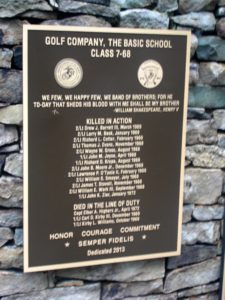If you spend much time watching TV news, trolling the internet, listening to talk radio, or, if you are old like me, reading the newspaper, one might come to the conclusion that the United States was going to hell in a hand basket.
Note to millennials – the newspaper was an ancient means of mass communication using a flat tactile substance made from pulverized and reconstituted wood fibers. It is more commonly known as paper. Ink is placed on this paper and writers’ reports and columnists’ ideas are transferred to the reader using these two medium – ink and paper. In a more primitive time young underpaid helmet-less boys riding bicycles with big bags on the front would throw these newspapers aggressively at your front door, occasionally breaking a window.
The “good news” that is reported (low unemployment, high stock prices, strong dollar, few US military deaths, technological advances, medical breakthroughs, decreased auto fatalities, record US auto production, lower violent crime rates, etc.) seems to be usurped by the bad news (Continued craziness in the middle east, terrorist activity around the globe, mass shootings, police related violence, and a national political scene seemingly pulled from an SNL skit).
So what’s really going on here in America?
In my blog entries I have tried to limit my opinions to areas where I have direct first-hand experience. I do, however, form my own personal world view based on a number of sources beyond personal observation, which of course is limited. I have listed the sources I like and use below in a post script, but I don’t want to merely rehash the thoughts of others
So this blog on America is based on my personal observations.
Road Trip – 2016
I left Seattle on June 15 of this year on a 7,500-mile cross country road trip starting in Seattle, going through parts of Oregon, Idaho, Utah, Colorado, Kansas, Oklahoma, Arkansas, Tennessee, Mississippi, Alabama, Georgia, South Carolina, North Carolina, Virginia, West Virginia, Maryland, Pennsylvania, Ohio, Indiana, Illinois, Wisconsin, Minnesota, North Dakota, and Montana.
Here is what I saw:
I saw or experienced no crime, nor even any scary people. Kind and friendly people were the norm virtually everywhere.
Gas was cheap. Trains were numerous, full, and moving in all directions. So were trucks which were hauling goods and raw materials, even in the most remote stretches of Montana.
Parking lots at malls and shopping centers were busy/mostly full.
I slept two nights in rest stops in the back of the car, and was never worried about my safety.
It is hard to judge local economics from a short visit or whistle stop, but you do get a vibe just from looking around. Some small towns seemed to be hurting with dilapidated buildings and not many signs of life. More, however, where vibrant and moving. Some of the big cities were booming, others plugging along.
I saw some people who seemed to be struggling with drugs or mental illness. I also saw a couple of food banks actively distributing food.
One rough looking guy hit me up for money for his family for dinner as I was walking in to order take-out at a pizza joint in Tulsa. He talked about being a Christian and being a hard worker. I don’t know if really I believed him, but we walked into the restaurant like we were together & I bought him a pizza along with my order. He thanked me and said he also appreciated that I had treated him with dignity. It may have been a line he had used many times, but I felt good about it and I also felt good about the people in the restaurant serving us as they did seem to treat him with the same respect they did me even though I suspect they knew him and that this was a regular occurrence.
Bathrooms were generally pretty clean almost everywhere, and when the men’s room was full in Shelby Montana, the clerk said “go ahead and use the ladies room” with not even a trace of irony or snicker. In North Carolina I did hear a bathroom joke, but it was not too mean spirited – mostly just sophomoric.
I saw many apparently Muslim women and families in places I had not expected to see them like rural Minnesota and rural Illinois. The were going about their business as if they belonged here. I saw no terrorists.
I heard Spanish and other languages I could not immediately identify being spoken in almost every state, usually interspersed with English.
On a reservation in Montana the clerk, after saying “Welcome to the Black Feet Nation”, asked if Marshawn Lynch had really retired. He had noted from my license plate that we were from Washington State and he was a big fan of the African-American Seattle Seahawks running back. We informed him that yes, Marshawn had retired, but that we had a new running back who we were excited about. He seemed pleased.
I saw some Trump signs on farms and some Bernie bumper stickers on cars. The yard signs I saw were almost all for local sheriffs or other local positions. I had expected to hear political talk in some of the rural dinners I ate in but there was none.
Mostly people were talking about the weather, local issues such as construction projects, gossip, and sports or hobbies. National politics and international problems don’t appear to have much impact on the real people I observed living their lives.
I had many conversations with the friends and relatives I stayed with across the country. Everyone I stayed with was either employed or happily retired. All seemed to have very nice living situations and recreational opportunities.
Their problems were personal/family in nature, primarily caused by illness of either the mind or body. Most had opinions on the national and international issues, but the bulk of the conversations were about what is real for them, family, health, jobs or retirement, and relationships.
The hundreds of people I observed personally during my trip were pretty impressive just being ordinary.
Of course I realize that I am a terminally “glass half-full kind of guy.” My slice of America is not necessarily representative, but it is very real.
And sure, the problems I did not observe on this trip but which are reported in the media are significant and there are many things to work on.
But what is so bad that we can’t make improvements without yelling, screaming, or creating hatred of people different from ourselves or fostering fear of change?
Bottom line for me:
America IS Great, right now!
PS
For the record, my smorgasbord of primary sources of information, news, and opinion beyond my personal experience are the following (in no particular order):
The Wall Street Journal, The Seattle Times, Time Magazine, The Economist, Local TV news in Seattle and Gettysburg/York PA, PBS Newshour, NPR radio, CBS & NBC nightly news, USA Today, CNN, BBC, and, to keep it all juicy and unbalanced, MSNBC, FOX News and Facebook. I don’t tweet. I don’t watch entertainment/celebrity news, although sometimes it is hard to tell the difference. One of my favorite columnists is the somewhat conservative David Brooks of the New York Times and PBS Newshour. Here is a recent column he wrote about how we are doing:

